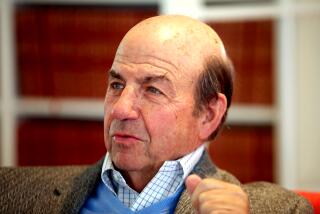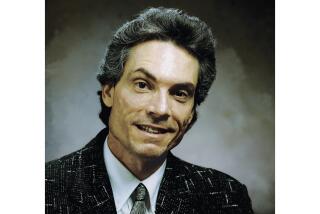Alex Tizon dies at 57; journalist told stories about America and won Pulitzer for exposing corruption
It wasn’t like Pulitzer Prize winner Alex Tizon to leave his readers puzzled. He was a polished and distinctive storyteller, and his writing brimmed with clarity.
But when the journalist, author and University of Oregon assistant professor died unexpectedly Thursday at his home in Eugene, Ore., his friends were stunned by the news. Tizon was just 57 when he died in his sleep from natural causes, his family said.
“How could someone with so much to offer leave us so quickly, so young?” asked retired reporter Eric Nalder, who shared a Pulitzer with Tizon at the Seattle Times, where Tizon worked 17 years before becoming the Seattle bureau chief for the Los Angeles Times from 2003 to 2008.
“Alex had voice, such an important element in great writing, and to that talent he added fine reporting, compassion and style,” Nalder said in a Facebook post.
Second that, said L.A. Times Deputy Managing Editor Scott Kraft, who hired Tizon when Kraft was national editor.
“Alex was, from his earliest days at the L.A. Times, one of the most gifted writers on our national staff,” Kraft said. “He had a remarkable ability to find compelling stories from remote places and then polish them into diamonds. He was just a wonderful storyteller, with a wise and empathetic writer’s voice.”
As a reporter, Tizon sought out the people and places often overlooked and generally dismissed, and he wrote about them with empathy and, when called for, wry humor. There was his 2007 piece on Bethel, Alaska, for example, a remote village that became the unlikely taxicab capital of the United States.
“Bethel (population 5,800),” he wrote from isolated southwest Alaska in 2007, “buzzes with 93 taxi drivers, or roughly one cabbie for every 62 residents. That’s by far more taxi drivers per capita than anywhere else in the country…Furthermore, Bethel only has about 10 miles of paved roads, which means there are about nine cab drivers per paved mile.”
Steve Pierce, a former editor, said when Tizon turned in a story he found himself so caught up in the narrative that “I typically forgot to consider any editing I perhaps should be doing.”
The stories that enamored Tizon most were serious, long-form journeys probing the meaning of life, including his own. After years of telling other people’s stories, he wrote a 2014 memoir, “Big Little Man: In Search of My Asian Self,” a deep descent into his Filipino boyhood and the racial slights and doubts he carried into adulthood.
Tomas Alexander Asuncion Tizon was born Oct. 30, 1959, in Manila, Philippines, the second of nine children.
“His parents admired white Americans and all things Western,” wrote Seattle book reviewer Florangela Davila. “Tizon once caught his father massaging and pinching his nose to make it sharper and narrower, and less round and Filipino-looking. ‘I took it a step farther,’ Tizon said. ‘I used to put clothespins on my nose.’”
Davila said Tizon also admitted to hanging from pull-up bars in an attempt to get taller. Tizon believed a man’s physical size in “the land of the giants,” as his father called the U.S., was linked to one’s worth.
Tizon’s family immigrated to the United States in the 1960s when he was 5, and moved from coast to coast. Tizon completed high school in Salem, Ore., earned a political science degree at the University of Oregon and then a master’s degree in communication from Stanford. What shaped much of his thinking, however, was American culture.
“Everything I saw on TV, in the movies, in books corroborated the sense of Asian men being less manly, less masculine than other men,” he said. The struggle to belong “is really what my book’s about.”
He seemed to have found that in journalism.
“Many of us will remember when he first set foot in the Seattle Times newsroom, bright, talented and hungry to understand the world in all its glory and misery,” said former Seattle Times reporter Dick Clever.
Over the years, Tizon worked his way up from local crime coverage to reporting from Asia. He also did a tour with the paper’s investigative team that included a series with Nalder and Deb Nelson on corruption in the Native American housing program that won the 1997 Pulitzer.
He also contributed stories and material to Newsweek and CBS’ “60 Minutes.”
Though he’d been teaching at Oregon since 2011, he hadn’t stopped reporting. In a piece for the Atlantic magazine last year, his style, depth, heart and talent were on full display in a story called “In the Land of Missing Persons.”
It was the continuation of a story he first told in the L.A. Times a decade back, focused on Alaskans who go missing, turn up and then go missing again, a not uncommon occurrence in the Last Frontier. Two years ago, the family of a man who’d gone missing contacted Tizon and asked if he’d do a follow-up. The family had heard the man’s remains had been found.
Tizon’s opening line of the story he wrote for the Atlantic was immediately captivating: “They found what was left of him in the spring of 2014.”
“He had more stories in him,” his wife, Melissa Tizon, told the Seattle Times. “He had another book in him.”
Besides his wife, he’s survived by two daughters, Dylan, 26, and Maya, 17.
Rick Anderson is a special correspondent for The Times.
More to Read
Start your day right
Sign up for Essential California for the L.A. Times biggest news, features and recommendations in your inbox six days a week.
You may occasionally receive promotional content from the Los Angeles Times.






